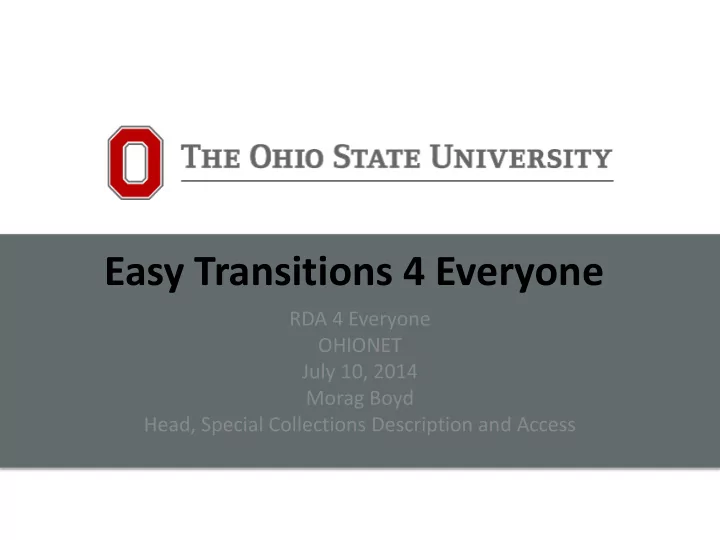

Easy Transitions 4 Everyone RDA 4 Everyone OHIONET July 10, 2014 Morag Boyd Head, Special Collections Description and Access
Outline • Background • Training Approaches: Take 1 • Training Approaches: Take 2 • Ongoing Challenges • Change Management • Making It Through
Background Large library system Cataloging is distributes across the organization • University Libraries • CDAD • SCDAD • Music and Dance • In the system • Law • Health • 3 Regionals
Special Collections Description and Access (SCDA) • Responsible for cataloging and coordinating archival processing for all University Libraries Special Collections • 7 Special Collections • Staffing • Department Head (me) • 4 staff with cataloging responsibilities, including a Cataloging Coordinator • Processing Coordinator
Two Transitions • January 2012 • OSUL Commits to June RDA implementation • June 2012 • OSUL adopts RDA for Original Cataloging • Fall 2012 • 75% of department staff retires • January 2013 • New staff begin • June 2013 • SCDA re-implements RDA for (most) Original Cataloging
Coordinated Effort • RDA Implementation Training Team formed • 6 members, with varying areas of expertise • Identified all staff with original cataloging responsibility • Approx. 25 people • Adopted a “train the trainer” method • Training Team worked through the available online training together • Developed versions to deliver in-house
OSUL Training • Laid the foundation • Brown-bag webinars on FRBR and other concepts • Workshop Series • 3 workshops, each 3 hours long • Team taught by a pair of instructors • Hand-on lab session • Everyone participated • Separate short workshop and checklist for copy catalogers
… Followed by the PARTY!!!!
Early Adopter Challenges • LC PCC PS were still being developed • Had to make LOTS of local policy as part of the training development process • … and left a long list for the Catalog Policy, Process and Training Committee to tackle • Not many resources to draw from
Lessons Learned Working in pairs was great! Offering flexible scheduling and locations Brown bags were a great way to prep Lots of handouts But not so good … o Not enough hands-on o Still too much “theory” or abstract concepts
Implementation Phase • Brown bags to discuss issues about a month after implementation In my department … • Staff did not feel ready to implement • Wanted many more examples • Confused by varying practice in RDA records they did find
Do-over time! • Cataloging Coordinator and I worked together to develop and deliver the training • Flipped the classroom • Assigned more pre-work of viewing webinars, etc. before going into the workshop • Did a series of 4 workshops, 3 hours long
Content updates • By this time, LC had overhauled their modules and many more sources also available • Much more concrete in approach • Incorporated many more examples from our actual workflow • Included hands-on work • Each person had three example items to work on during a session
Implementation: Big Improvement Daily review • All new original placed on a cart • Assigned people to review production from previous day • Cataloging Coordinator compiled results Weekly meeting • Interesting examples from daily production • Establish local policy, if needed Review continued for about 2 months
Ongoing Challenges • RDA is updated twice a year • Can even happen on the day of your workshop • Most people still have to be self-taught before they can teach
A conundrum … • So how much FRBR do you really need to know? • Should you do the compare/contrast with AACR2? • Should we ignore MARC?
Family of Works 1 Based on diagram in “Bibliographic Relationships,” Barbara B. Tillett. Ch. 2 in: Relationships in the Organization of Knowledge, edited by Carol A. Bean and Rebecca Green. Dordrecht, Boston, London: Kluwer Academic Publishers, 2001, p. 19-35. Equivalent Derivative Descriptive Free Review Translation Microform Edition Casebook Summary Reproduction Abstract Dramatization Simultaneous Abridged Criticism Novelization Digest “Publication” Edition Screenplay Copy Libretto Evaluation Illustrated Revision Edition Change of Genre Exact Parody Annotated Expurgated Reproduction Translation Imitation Edition Edition Same Style or Variations or Facsimile Arrangement Thematic Content Versions Commentary Slight Reprint Adaptation Modification Original Same Work – Cataloging Rules New Work Work-- Same New Expression Cut-Off Point Expression
Created/Created by Pride and Jane Austen prejudice (Work) (Creator) Expressed/Is expressed by Text in French Spoken word in Text in original translation (E) English (E) English (E) Manifested/Is manifested by Art Cannot Be Editions ABC, Audio Pub. Co. T. Edgerton, Damaged, Inc., 2002 (M) 2006 (M) 1813 (M) 2009 (M) Gutenberg.org, 1998 (M) Exemplified/Is exemplified by Owned by ? (I) Owned by LC (I) 1 Owned by LC Owned by Owned by LC with condition(I) NLSBPH (I) with barcode (I)
Work Reminder: Entity 1 inherent Harry Potter and the relationships in FRBR Sorcerer’s Stone by J.K. Rowling Expression 3 Expression 2 Expression 1 Spoken word Text — Text — English performance in German French Manifestation 1 Manifestation Manifestation 1 Hamburg: 1 London: Carlsen, 1998 Manifestation 2 Paris: Bloomsbury, New York: Gallimard 1997 Levine, 1998 Jeunesse, 2000. Item 2 Item 1 OSU Sp. Coll. OSU Libraries autographed copy 1 copy
My answer • The first time, we really focused on FRBR and RDA Terminology and invested a lot of time in the theory • … “you mean uniform title, right?” … “umm .. Yes …” • The second time, we did lay the foundation, but after that focused much more on “item in hand” • But the staff were already on board with the theory
Change Management 1. Prepare for change 2. Manage the change 3. Reinforce the change
Questions? Boyd.402@osu.edu
Recommend
More recommend